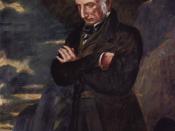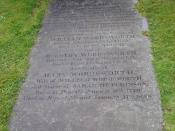English 461 Romantic and Victorian Poetry
October 2, 2001
Tidal Influences
Mathew Arnold's poem, Dover Beach, is narrative in style and emphasized by the use of the present tense. The reader is immediately drawn in by this lyrical approach. Although this poem is told in the present tense, Dover Beach seems to be a recollection of an earlier time. Hence, the reference to a "Sea of Faith" is presented as an historical interlude. The poet not only begins his commentary in readily understandable language, but his verse calls upon all of our senses.
The following is a personal explication of Dover Beach.
1-Life is serene and the moon is centered over the Straights of Dover.
3-France had a moment of brightness, but brief, before England once more is the major power of the world and in a period of tranquility. (A distinct possibility that this explicator has perceived more than the poet intended).
6- Come to the window and open your senses to the odors, sights and sounds that this monthly occurrence brings. (Suddenly, another human is present: probably his love, as this seems to be an autobiographical poem).
9- At this point, Arnold calls upon our sense of hearing. The grating roar gives way to the eternal sameness of life. The pebbles of the beach are flung like weapons and then the tide withdraws again causing a feeling of sadness.
15- Arnold is reminded of a thought put forth by Sophocles: the same senses are awakened to the south, on the Aegean Sea.
19- And still, in Arnold's time, and in the Straights of Dover, the same life pattern plays on into infinity.
21- The "Sea of Faith" offers at least two concepts: Faith is a euphemism for religion, or faith simply implies trust and confidence. Whichever definition...


